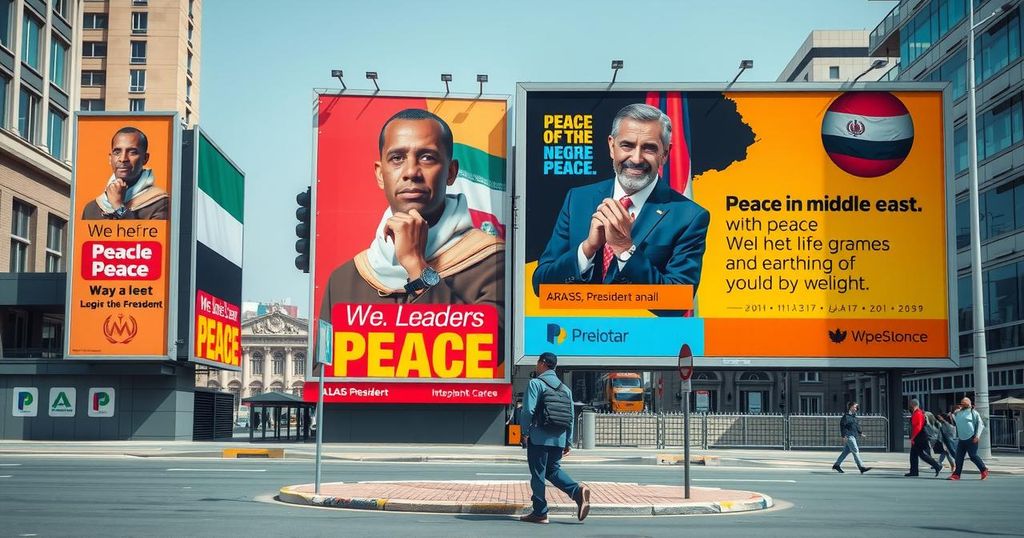Can the US Broker New Ties Between Israel, Lebanon, and Syria?

- US aims to expand peace accords with Syria and Lebanon.
- Diplomatic efforts are rising post recent conflict between Iran and Israel.
- The Abraham Accords lead to normalization with several Arab nations.
- Historical tensions complicate ties between Israel and Lebanon, Syria.
- Achieving peace remains elusive due to ongoing military conflict.
Examining US diplomatic efforts in the region
The Potential for US-Brokered Israeli Relations with Lebanon and Syria In the wake of the recent 12-day conflict involving Iran, Israel, and the United States, diplomatic efforts in the Middle East seem to be gaining traction. Israeli Prime Minister Benjamin Netanyahu has noted that the military victory over Iran has paved the way for what he deems as a significant expansion of peace accords. Billboards now dot the landscape in Israel, depicting Arab leaders including Lebanon and Syria’s presidents, placing U.S. President Donald Trump centrally with the proclamation, “The ‘Abraham Alliance: It’s Time for a New Middle East.” The ‘Abraham Accords,’ originally established in 2020, set the tone for the normalization of relations between Israel and various Arab nations, such as the UAE, Bahrain, Morocco, and Sudan. However, when it comes to establishing ties with Syria or Lebanon, things get complicated due to a long history of conflict.
Challenges in Syrian-Israeli negotiations
The Complexity of Peace Agreements with Syria and Lebanon Adding to the complexity, Neil Quilliam, an associate fellow at Chatham House, commented, “The signatories to the Abraham Accords were never really in conflict, whereas Israel and Lebanon, and Israel and Syria are in a decades-long conflict.” Looking at the historical backdrop, Syria and Israel have been officially at odds since the war in 1967, sparked by Israel’s occupation of the Golan Heights—an issue still unresolved to this day as the international community, including the UN, never recognized Israel’s annexation. Even after the 2024 overthrow of President Bashar Assad by a militia alliance led by Ahmed al-Sharaa—and subsequent Israeli military presence in Syria—there remains a complex dynamic to navigate. Trump’s administration, nonetheless, has increasingly hinted at a pursuit for a security agreement between the two nations. Over recent weeks, Syrian media has contended that negotiations hinge on Israel’s adherence to the 1974 disengagement agreement, indicating a stiff diplomatic road ahead.
The bleak outlook for Lebanon
Limited Prospects for Lebanon as a Peace Partner Turning towards Lebanon, Quilliam does not hold much optimism for any near-term peace initiatives. He pointed out that Lebanon’s President Aoun and the surrounding political establishment face considerable domestic resistance that would likely prevent any real progress toward peace. After the Hamas attack on Israel in October 2023, Hezbollah, which has been labeled a terrorist organization by the US and EU, initiated conflict against Israel from the southern border, culminating in a violent escalation over the following months. Israel managed to diminish Hezbollah’s influence, yet the human and infrastructural costs were severe, with over 3,000 casualties and extensive damage across southern Lebanon and parts of Beirut. Even as a ceasefire was achieved in January 2025, unresolved conditions such as troop withdrawals mean that hostilities remain a real concern. Quilliam reiterated, “Israel still occupies five outposts and continues to strike at will; peace seems unattainable with Hezbollah’s ongoing militarization.”
US intentions and geopolitical implications
Understanding the US Intentions Behind Peace Efforts The United States, particularly under Trump’s administration, appears to be striving for more peaceful relations in the region. Analysts suggest that the recent easing of sanctions on Syria, alongside continued conversations for peace deals, aligns with an effort to strengthen alliances not just with Israel but also with key Gulf states like Saudi Arabia and the UAE. Middle East researcher Kelly Petillo from the European Council on Foreign Relations explained, “Trump has shown a desire to secure a Nobel Peace Prize by fostering peace in the Middle East, aiming to expand the Abraham Accords.” Yet, she raised concerns—primarily about the feasibility of Trump’s approach, particularly given the absence of measures to restrain Israel’s more aggressive strategies, which could lead to further instability in Syria and Lebanon. Furthermore, both Quilliam and Petillo criticized Trump’s diplomatic capabilities, suggesting that he lacks the necessary skills to mediate effectively in these convoluted matters.
The blooming prospect of a US-brokered peace initiative featuring Israel, Syria, and possibly Lebanon faces significant hurdles. Various historical conflicts and current military tensions complicate these diplomatic advances. While Trump’s administration signals a desire for normalization in relations, the underlying complexities reveal that achieving peace in this tense region will require substantial work and a more nuanced approach.







